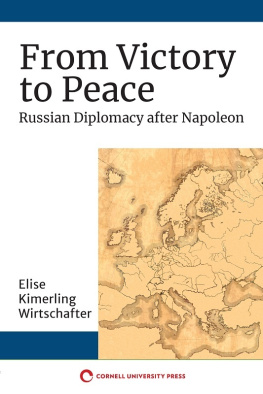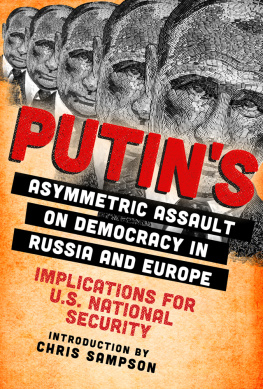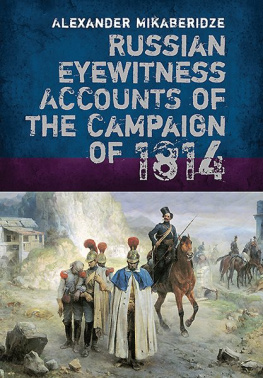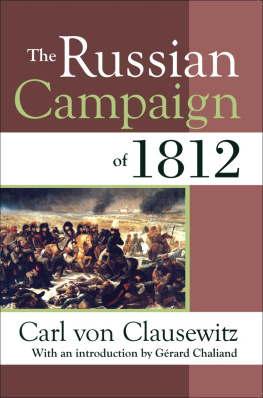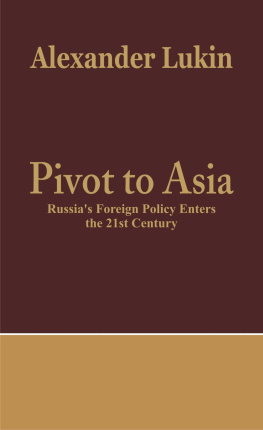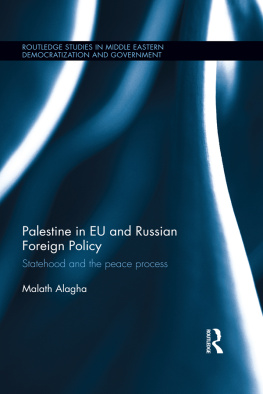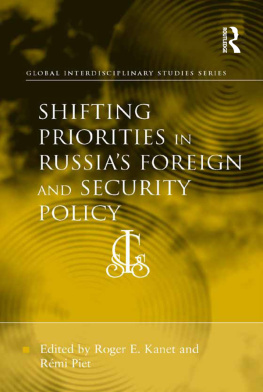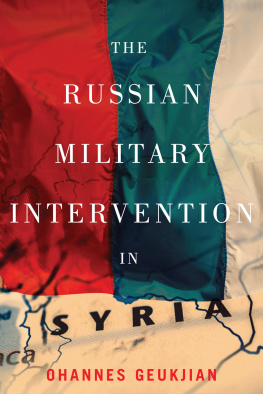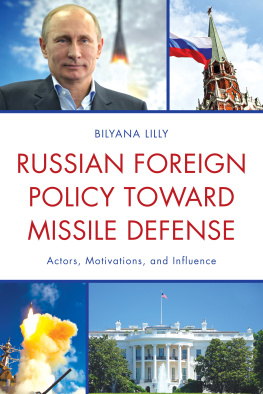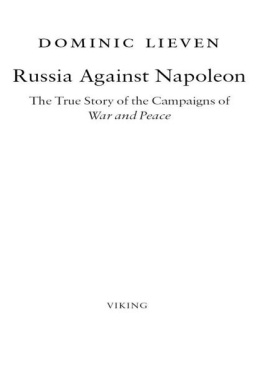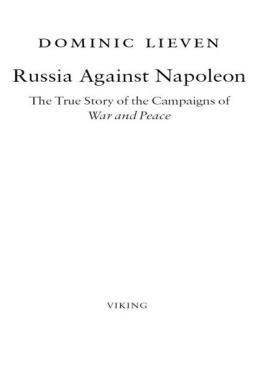From Victory to Peace
A volume in the NIU Series in Slavic, East European, and Eurasian Studies
Edited by Christine D. Worobec
For a list of books in the series, visit our website at cornellpress.cornell.edu.
From Victory to Peace
Russian Diplomacy after Napoleon
Elise Kimerling Wirtschafter
Northern Illinois University Press
an imprint of Cornell University Press
Ithaca and London
Copyright 2021 by Cornell University
The text of this book is licensed under a Creative Commons Attribution-NonCommercial-NoDerivatives 4.0 International License: https://creativecommons.org/licenses/by-nc-nd/4.0/.
To use this book, or parts of this book, in any way not covered by the license, please contact Cornell University Press, Sage House, 512 East State Street, Ithaca, New York 14850. Visit our website at cornellpress.cornell.edu.
First published 2021 by Cornell University Press
Library of Congress Cataloging-in-Publication Data
Names: Wirtschafter, Elise Kimerling, author.
Title: From victory to peace: Russian diplomacy after Napoleon / by Elise Kimerling Wirtschafter.
Description: Ithaca [New York]: Northern Illinois University Press, an imprint of Cornell University Press, 2021. | Series: NIU series in Slavic, East European, and Eurasian studies | Includes bibliographical references and index. |
Identifiers: LCCN 2020037692 (print) | LCCN 2020037693 (ebook) | ISBN 9781501756016 (paperback) | ISBN 9781501756498 (pdf) | ISBN 9781501756030 (epub)
Subjects: LCSH: RussiaForeign relations18011825. | RussiaHistoryAlexander I, 18011825. | EuropeForeign relations18151871. | RussiaForeign relationsEurope. | EuropeForeign relationsRussia.
Classification: LCC DK197.W57 2021 (print) | LCC DK197 (ebook) | DDC 327.47009/034dc23
LC record available at https://lccn.loc.gov/2020037692
LC ebook record available at https://lccn.loc.gov/2020037693
Cover image adapted by Valerie Wirtschafter.

This book is published as part of the Sustainable History Monograph Pilot. With the generous support of the Andrew W. Mellon Foundation, the Pilot uses cutting-edge publishing technology to produce open access digital editions of high-quality, peer-reviewed monographs from leading university presses. Free digital editions can be downloaded from: Books at JSTOR, EBSCO, Hathi Trust, Internet Archive, OAPEN, Project MUSE, and many other open repositories.
While the digital edition is free to download, read, and share, the book is under copyright and covered by the following Creative Commons License: CC BY-NC-ND 4.0. Please consult www.creativecommons.org if you have questions about your rights to reuse the material in this book.
When you cite the book, please include the following URL for its Digital Object Identifier (DOI):https://doi.org/10.7298/dm6r-4f91
We are eager to learn more about how you discovered this title and how you are using it. We hope you will spend a few minutes answering a couple of questions at this url:
https://www.longleafservices.org/shmp-survey/
More information about the Sustainable History Monograph Pilot can be found at https://www.longleafservices.org .
To my soulshine, Landon and Papy
Contents
xi
xv
xvii
xix
Contrary to Russias present-day position on the political and psychological periphery of Europe, the period from the end of the Napoleonic Wars to the Crimean War (185356), and arguably until the Bolshevik Revolution of October 1917, represented a time of full integration into European society and politics. During this period, the Quadruple Alliance, the general alliance, the grand alliance, and the European political system stood as cornerstones of Russian diplomacy. Russia had led the allied coalition that defeated Napoleon in 181314, its armies had performed heroically and honorably in 1812, and its emperor had come to be seen by his subjects and intimates as the divinely anointed savior of Europe. From the Russian point of view, the glorious victory of 1812 and the subsequent wars leading to Napoleons dethronement showed that Emperor Alexander I (ruled 180125) and his people, together with their allies, served as Gods instrument in human history. Not surprisingly, in the eyes of Russias monarch and diplomats, the peace settlement reached in 181415, and the peacemaking that continued in subsequent years, appeared equally providential.
The basic contours of what contemporaries referred to as the European political system were forged at the Congress of Westphalia, where rulers and diplomats recognized state sovereignty (not empire, dynasty, or religious belief) as the foundation of European order. Based on the principle that state sovereignty gave to each government the right to choose a domestic religion and political structure, free from the threat of outside intervention, the peacemakers also embraced the principle of a balance of power between independent states that aimed to preserve European equilibrium and prevent any one country from becoming powerful enough to achieve hegemony. Ultimately, the treaties of Westphalia failed to stop revolutionary France from overturning the equilibrium or Napoleonic France from dominating Europe. Thus, once Napoleon had been defeated militarily, it became necessary to reconstruct the European state system. After roughly twenty-five years of brutal warfare, fragile coalitions, and exhausting diplomacy, the continents rulers and diplomats were eager to establish an enduring peace and prepared to make substantive compromises to achieve that goal. In a series of multilateral treaties, conventions, and protocolsproduced primarily but not exclusively in Paris and at the Congress of Vienna in 181415political leaders reconstituted the public law of Europe, which then provided the legal framework for interstate diplomacy and relations between governments and peoples.
Generations of historians have researched the chess game of European politics during the French Revolution, the Napoleonic Empire, and the peacemaking that followed the victory over France. The quality of this scholarship is impressive, yet the diplomacy of the era continues to fascinate and baffle. In recent decades, the reconstruction of Europe at the Congress of Vienna has been seen as a model of multilateral diplomacy and collective security arrangements that established precedents for todays United Nations and European Union. In addition, historians have moved beyond simplistic characterizations of Russias actions, recognizing instead the critical and often salutary role of Emperor Alexander I. Scholarly perspectives have become diversified; however, significant aspects of European politics in the Restoration era remain understudied. These include the conceptual apparatus developed in diplomatic discourse and the relationship of diplomacy to national or local political cultures.
Among the great powers of Restoration Europe, the Russian Empire is the least integrated into both past and current historiography. Through study of Russian diplomacy in the years 181523, this book broadens the knowledge base available to historians and helps to fill a striking historiographical gap. Beginning in the immediate aftermath of the Congress of Vienna and continuing through the Congress of Verona, Europes statesmen worked tirelessly to implement the edifice of pacification and peace constructed in 1814, 1815, and 1818. They completed territorial negotiations, codified political arrangements, and brought a defeated France back into the alliance of great powers. Equally significant, they confronted dangerous revolts and military crises in Europe, the Ottoman Empire, and Spanish America. In response to these developments, Emperor Alexanders hopes for peace, his pragmatic adaptability, and his commitment to act in concert with the other great powers came fully into focus. Close attention to Russian diplomacy, based on sources of Russian provenance, challenges characterizations of Alexanders behavior as erratic and his foreign policy as heavy-handed and expansionist. Indeed, as historians assimilate the Russian perspective on European order (as well as the perspectives of other less well-studied countries and peoples), they encounter a multifaceted Restoration built upon the practices of enlightened reformism and direct experience of costly revolution and war.
Next page
